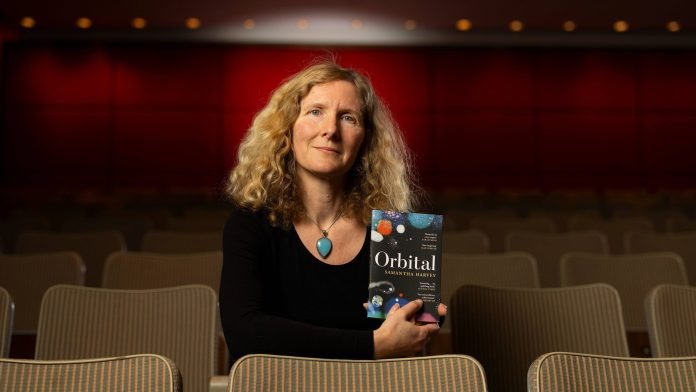
Orbital by Samantha Harvey was on 12 November 2024 named the winner of the Booker Prize 2024. Harvey receives £50,000 and a trophy, which was presented to her by Paul Lynch, last year’s winner, at a ceremony held at Old Billingsgate in London, the The Booker Prizes website reported.
Orbital, which is Harvey’s fifth novel and sixth book, takes place over a single day in the life of six astronauts and cosmonauts aboard the International Space Station. During those 24 hours they observe 16 sunrises and 16 sunsets over their silent blue planet, spinning past continents and cycling past seasons, taking in glaciers and deserts, the peaks of mountains and the swells of oceans. This compact yet beautifully expansive novel invites us to observe Earth’s splendor, whilst reflecting on the individual and collective value of every human life.
Edmund de Waal, chair of judges, says, “In an unforgettable year for fiction, a book about a wounded world. Sometimes you encounter a book and cannot work out how this miraculous event has happened. As judges we were determined to find a book that moved us, a book that had capaciousness and resonance, that we are compelled to share. We wanted everything.
“Orbital is our book. Samantha Harvey has written a novel propelled by the beauty of 16 sunrises and 16 sunsets. Everyone and no one is the subject, as six astronauts in the International Space Station circle the Earth observing the passages of weather across the fragility of borders and time zones. With her language of lyricism and acuity Harvey makes our world strange and new for us.
“All year we have celebrated fiction that inhabits ideas rather than declaiming on issues, not finding answers but changing the question of what we wanted to explore. Our unanimity about Orbital recognizes its beauty and ambition. It reflects Harvey’s extraordinary intensity of attention to the precious and precarious world we share.”
Gaby Wood, chief executive of the Booker Prize Foundation, adds, “I’ll be very sad to see this year’s judging panel go. One of them said she would hear the others’ voices in her head as she read from now on, and I will continue to feel the reverberations of this panel’s enlightened, empathetic act of collective reading too.
“From a fantastically strong shortlist, they have chosen as their winner a small, strange, beautiful and mighty book by Samantha Harvey, a writer last longlisted for the Booker 15 years ago, who has done nothing but cement and extend her brilliantly original gifts.
“Orbital wins the prize in a year of geopolitical crisis, likely to be the warmest year in recorded history. A book about a planet “shaped by the sheer amazing force of human want”, about an “unbounded place” with no wall or barrier visible from space, with all politics “an assault on its gentleness”, it is hopeful, timely and timeless.”
Who is Samantha Harvey?
Born in Kent in 1975, the daughter of a builder, Samantha Harvey studied philosophy at the University of York and University of Sheffield. A writer and sculptor, in the 2000s, she worked at the Herschel Museum of Astronomy in Bath, the site from which the planet Uranus was discovered. She is now a tutor on the MA course in creative writing at Bath Spa University and the author of five novels.
She was longlisted for the Booker Prize in 2009 for her debut novel The Wilderness, about an aging architect who is suffering from Alzheimer’s. The book was awarded the Betty Trask Prize. Harvey, whose writing has been compared to that of Virginia Woolf, is known for the enormous variety of her novels’ settings (in 2017, she told The Bookseller: “I try to do something formally different with each novel”). Prior to Orbital, her previous novel, The Western Wind, was about a priest in 15th century Somerset. In 2020 Harvey published her first book of non-fiction, The Shapeless Unease: A Year of Not Sleeping, about her personal experience of chronic insomnia.
She has been shortlisted for the James Tait Black Award, the Women’s Prize, the Guardian First Book Award and the Walter Scott Prize. Her writing has appeared in Granta Magazine, The Guardian, The New York Times, The New Yorker, The Telegraph and TIME magazine.
Although her latest book is set in the hi-tech world of the International Space Station, Harvey herself lives a fairly low-tech life. She has no social media accounts and has admitted that she doesn’t own a mobile phone.
The only British writer on the Booker Prize 2024 shortlist, Harvey is also the first woman to win the prize since 2019, when it was shared by Bernardine Evaristo and Margaret Atwood.
What is Orbital about?
Six astronauts and cosmonauts – from America, Russia, Italy, the UK and Japan – rotate in the International Space Station. They are there to do vital work, but slowly they begin to wonder: what is life without Earth? What is Earth without humanity?
Together, as they travel at speeds of over 17,000 miles per hour, they watch the planet beneath them, circling it 16 times in a single day, observing its weather patterns and borderless beauty.
We glimpse moments of their earthly lives through brief communications with family, their photos and talismans; we watch them whip up dehydrated meals, float in gravity-free sleep, and exercise in regimented routines to prevent atrophying muscles; we witness them from bonds that will stand between them and utter solitude.
Yet although separated from the world, they cannot escape its constant pull. News reaches them of the death of a mother, and with it comes thoughts of returning home. They look on as a typhoon gathers over an island and people they love, in awe of its magnificence and fearful of its destruction.
The fragility of human life fills their conversations, their fears, their dreams. So far from earth, they have never felt more part – or protective – of it.
Orbital is one of only a handful of novels set in space to have been nominated for the Booker Prize over the years, and is the first space-set winner. At 136 pages, it is one of the shortest ever Booker Prize winners, though not quite as short as Offshore by Penelope Fitzgerald, winner of the 1979 prize.
What has Samantha Harvey said about Orbital?
“I wanted to write about our human occupation of low Earth orbit for the last quarter of a century – not as sci-fi but as realism. Could I evoke the beauty of that vantage point with the care of a nature writer? Could I write about amazement? Could I pull off a sort of space pastoral? These were the challenges I set myself.”
How did Samantha Harvey research Orbital?
Most of the book was written during Covid lockdowns, during which Harvey watched many hours of online footage from the International Space Station. In an interview with BBC Radio 4’s Front Row program, Harvey said: “I would have footage of the Earth in low Earth orbit on my desktop all the time as I wrote. It was my main reference point. It felt such a beautiful liberation to be able to do that every day, and at the same time I was writing about six people trapped in a tin can. It felt like there was something resonant about that and our experience of lockdown, of not being able to escape each other, and also not being able to get to other people.”
(Compiled from The Booker Prizes website. Photos: The Booker Prizes website/ David Parry for the Booker Prize Foundation )

















